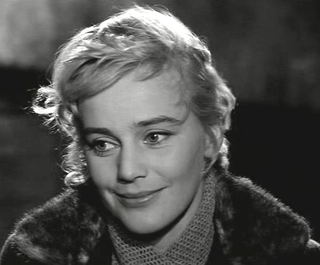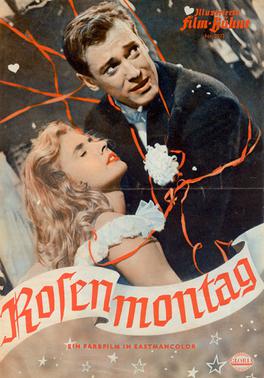
Maria Margarethe Anna Schell was an Austrian-Swiss actress. She was one of the leading stars of German cinema in the 1950s and 1960s. In 1954, she was awarded the Cannes Best Actress Award for her performance in Helmut Käutner's war drama The Last Bridge, and in 1956, she won the Volpi Cup for Best Actress at the Venice Film Festival for Gervaise.

Willy Birgel, born Wilhelm Maria Birgel, was a German theatre and film actor.

Richard Häussler was a German actor and film director. He appeared in more than 60 films between 1936 and 1964. He also directed seven films between 1951 and 1957. He was born in Munich, Bavaria, German Empire and died in Grünwald, West Germany.

The Last Bridge is a 1954 Austrian-Yugoslavian war drama film directed by Helmut Käutner and starring Maria Schell, Bernhard Wicki and Barbara Rütting. The film was entered into the 1954 Cannes Film Festival.
The term state actor has had different meanings in recent German history. In Nazi Germany, it was the highest title that could be awarded to a stage actor. Since 1945, the meaning has changed. In Baden-Württemberg, it is no longer simply a title of honor, but an official position.
Diesel is a 1942 German biographical film directed by Gerhard Lamprecht and starring Willy Birgel, Hilde Weissner, and Paul Wegener. It portrays the life of Rudolf Diesel, the German inventor of the diesel engine. It was one of a series of prestigious biopics made in Nazi Germany portraying genius inventors or artists struggling against the societies in which they live. The film was based on a biography by Eugen Diesel, one of Diesel's children.

The Deruga Case is a 1938 German crime drama film directed by Fritz Peter Buch and starring Willy Birgel, Geraldine Katt and Dagny Servaes. It is based on the 1917 novel of the same title by Ricarda Huch. It was shot at the Babelsberg Studios in Potsdam. The film's sets were designed by the art directors Wilhelm Depenau and Ludwig Reiber.

Chased by the Devil is a 1950 West German crime film directed by Viktor Tourjansky and starring Hans Albers, Willy Birgel and Lil Dagover.

When the Evening Bells Ring is a 1951 West German drama film directed by Alfred Braun and starring Willy Birgel, Maria Holst and Paul Hörbiger. It was shot at the Tempelhof Studios in West Berlin with sets designed by the art director Gabriel Pellon. It is unrelated to the 1930 silent film of the same title.

Don't Ask My Heart is a 1952 West German drama film directed by Paul Martin and starring Willy Birgel, Heidemarie Hatheyer and Maria Holst. It was shot at the Tempelhof Studios in West Berlin. The film's sets were designed by the art directors Hans Jürgen Kiebach and Gabriel Pellon

The Rose Garden is a 1989 American drama film directed by Fons Rademakers and written by Paul Hengge. The film stars Liv Ullmann, Maximilian Schell, Peter Fonda, Jan Niklas, Hanns Zischler, Alma Almagor as Ruthi and Kurt Hübner. The film was released on December 22, 1989, by Cannon Film Distributors.

The Marriage of Doctor Danwitz is a 1956 West German drama film directed by Arthur Maria Rabenalt and starring Marianne Koch, Karlheinz Böhm and Heidemarie Hatheyer.

Diary of a Married Woman is a 1953 West German comedy film directed by Josef von Báky and starring Maria Schell, O. W. Fischer and Margarete Haagen.

Between Time and Eternity is a 1956 West German-Spanish drama film directed by Arthur Maria Rabenalt and starring Lilli Palmer, Willy Birgel and Carlos Thompson. It was co-produced with Spain as part of a growing trend in European production.

The Last of Mrs. Cheyney is a 1961 comedy film directed by Franz Josef Wild and starring Lilli Palmer, Carlos Thompson and Martin Held. The film was made as a co-production between France, Switzerland and West Germany. It is based on the 1925 play of the same title by the British writer Frederick Lonsdale which has been adapted into films on several occasions.

Love's Carnival is a 1955 West German historical drama film directed by Willy Birgel and starring Ruth Niehaus, Dietmar Schönherr and Elma Karlowa. It was shot at the Wiesbaden Studios and on location in Baden-Baden and Rastatt. The film's sets were designed by the art directors Fritz Maurischat and Theo Zwierski.

Island of the Dead is a 1955 West German drama film directed by Viktor Tourjansky and starring Willy Birgel, Inge Egger and Folke Sundquist. It was shot at the Bavaria Studios in Munich. The film's sets were designed by the art director Dieter Bartels and Wilhelm Vorwerg. It premiered at the Marmorhaus in Berlin.

The Governor is a 1939 German drama film directed by Viktor Tourjansky and starring Brigitte Horney, Willy Birgel and Hannelore Schroth. It is based on the play Die Fahne by Emmerich Groh. It was shot at the Babelsberg and Tempelhof Studios in Berlin and on location in East Prussia. The film's sets were designed by the art director Max Mellin. It was produced on a budget of 715,000 Reichsmarks.

The Master of the Estate is a 1943 German drama film directed by Hans Deppe and starring Willy Birgel, Viktoria von Ballasko and Anneliese Uhlig. Location shooting took place in Pomerania, Mecklenburg and Ramsau in the Bavarian Alps. The film's sets were designed by the art directors Otto Gülstorff and Carl Ludwig Kirmse. It is based on the 1895 Swedish novel Der Majoratsherr von Halleborg by Alfred von Hedenstjerna.

















